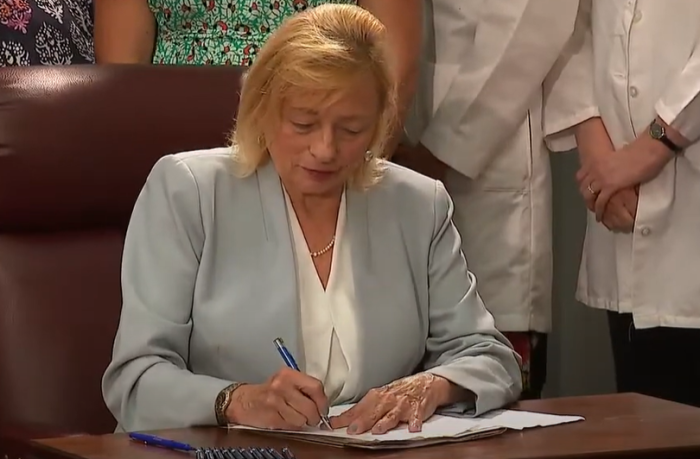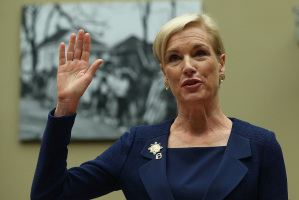Maine expands late-term abortion until to birth if deemed necessary by a doctor

Maine Gov. Janet Mills signed into law a measure that will expand the legality of late-term abortions in her state, allowing the procedure at any point during pregnancy if a doctor deems it necessary.
Mills, a Democrat, signed LD 1619, billed as "an act to improve Maine's reproductive privacy laws," into law Wednesday. Mills' approval of the bill follows its passage in a 73-69 vote in the Democrat-controlled Maine House of Representatives and a 20-11 vote in the Democrat-controlled Maine Senate.
The vote came down along party lines in the Senate, with all votes against the legislation coming from Republicans and all votes in favor coming from Democrats. In the House, five Democrats broke with their party to oppose it.
"Maine law should, must recognize that every pregnancy, like every woman, is different, and that politicians cannot effectively legislate this very personal and very difficult decision and the difficult nuances of abortion care," Mills said in a statement. "Instead, we must recognize the complexity of pregnancy and, like every other health care procedure, we've got to take government out of the decision-making process and put the doctor and patient in charge."
Mills contends that the bill modernizes the state's laws "to get politicians out of reproductive healthcare and make clear that the difficult decision of whether to have an abortion later in pregnancy will be made by a woman and her doctor and no one else."
LD 1619 enables more abortions to take place later in pregnancy, beyond a pregnancy's point of viability, where a fetus can survive outside the womb.
Specifically, LD 1619 removes language from state law declaring, "After viability an abortion may be performed only when it is necessary to preserve the life or health of the mother." Revised state law proclaims, "After viability, an abortion may be performed only when it is necessary in the professional judgment of a physician."
While Maine law previously stated that "any person not so licensed who knowingly performs an abortion on another person or any person who knowingly assists a nonlicensed person to perform an abortion on another person is guilty of a Class C crime," LD 1619 makes it so that the performance of or assistance in a nonlicensed abortion no longer constitutes a crime.
Carol Tobias, president of the pro-life group National Right to Life, condemned the passage of LD 1619 in a statement shared with The Christian Post.
"It is open season on the unborn child in Maine," she lamented.
"Abortionists practicing without a license can expect the state of Maine to turn a blind eye," Tobias added. "Governor Mills has been a strident supporter of abortion, and the signing of this law comes as no surprise."
Republican Rep. Laurel Libby called the legislation "the most extreme abortion law in the country."
"I'm heartbroken ... for the women who will be deceived to believe that late term abortion is the 'kind' option," Libby wrote in a statement shared by the Christian Civic League of Maine. "For our beloved state, that is embracing a culture of death. This is not the future I want for Maine."
Passage of LD 1619 comes more than a year after the U.S. Supreme Court's Dobbs v. Jackson Women's Health Organization decision determining that the U.S. Constitution does not contain a right to abortion. The ruling has led to widely divergent abortion laws in individual U.S. states.
The pro-life advocacy organization Susan B. Anthony Pro-Life America identified 25 states that have "put pro-life protections in place for both mom and child," ranging from near-total prohibitions to 15-week abortion bans.
On the other hand, Maine is among the remaining 25 states with "few or no protections" for unborn babies. The pro-abortion Guttmacher Institute lists Maine as one of 13 states that protect a right to abortion before viability based on laws in effect as of April 24.
The Guttmacher Institute data, not updated to reflect the new Maine law, notes that four states and the District of Columbia currently allow abortions "throughout pregnancy," meaning they are available up to the moment of birth: Colorado, New Jersey, Oregon and Vermont.
In addition to LD 1619, Mills' office announced that she had previously signed additional bills "intended to protect access to abortion" following the Dobbs decision. The package of legislation approved by Mills includes the prohibition of healthcare plans in Maine from imposing deductibles, copayment or any "other cost-sharing requirement" for abortions and a ban on municipalities from enacting local ordinances that outlaw the procedure.
Ryan Foley is a reporter for The Christian Post. He can be reached at: ryan.foley@christianpost.com





























